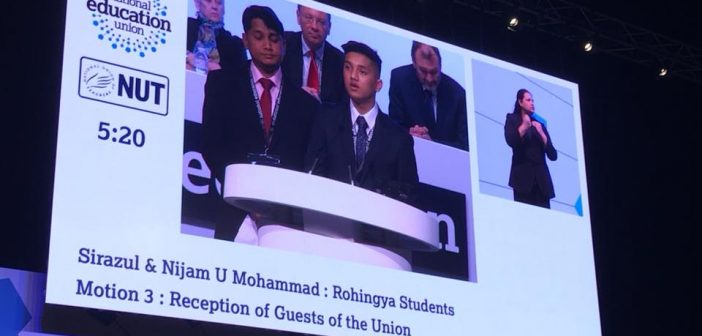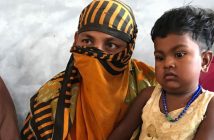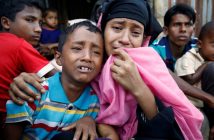Powerful and emotional speeches delivered by the British Rohingya Community to the UK’s National Education Union’s annual conference received standing ovations, cheers… and even a few tears
A delegation from the British Rohingya Community received standing ovations from attendees at the UK’s National Education Union’s annual conference in Brighton, England, after delivering powerful speeches on the plight of the Rohingya people.
The speeches, delivered by brothers Nijam and Sirazul Mohammad, focused on their own personal stories and also the wholesale persecution of the Rohingya people.
UN officials have formally stated this latest round of persecution includes “killing by random firing of bullets, use of grenades, shooting at close range, stabbings, beatings to death and the burning of houses with families inside” and say it bears “the hallmarks of a genocide.”
For Nijam and Sirazul’s family, and more than a million other Rohingya that have survived the ethnic violence, it has forced them from their homeland and made them refugees.
“I stand in front of you with a very heavy heart. I am distraught, I am almost hopeless,” Nijam Mohammad told the audience in Brighton. “I am here to seek your hand of support and friendship.”
“Today we are stateless, unwanted and subjected to ethnic cleansing. We are at the mercy of a ferocious military junta and extremist Buddhist vigilantes. Our crime? We are an ethnic minority.”
The Rohingya, Nijam explained to the Brighton audience, once had full rights in Burma.
“We had citizenship,” he said. “We had our homes, villages, communities and businesses. We had schools, properties, colleges and jobs in government. Our forefathers went to Rangoon University. But today? We are nobody. We are stateless in our own country.
Nijam is the General Secretary of the British Rohingya Community, an organisation dedicated to the on-going peaceful struggle to regain the Rohingya people their human rights and citizenship. His family fled the violence in his native Rakhine State, on the western coast of Burma, when Nijam was the age of eight and his family then lived in tents as refugees for 17 years, in the Gundam refugee camp near the town of Cox’s Bazar in south-eastern Bangladesh.
In 2009 they moved to the UK as part of the British government’s Gateway Protection refugee resettlement programme and Nijam has lived and worked in the northern English city of Bradford ever since. His 18-year-old brother Sirajul, who joined him on the stage in Brighton, was actually born in the Gundam camp in Bangladesh.
“I came to England when I was 7-years-old,” Sirajul told the National Education Union delegates. “We were given a nice place to live and people from the Council helped us settle down. Then I went to school. My first day was an eye opener. I liked it… But I was lost. I could not understand anyone. I could not speak a word of English or write the alphabet. In the camps we did not learn English.”
Sirajal explained that he has since passed eight GCSEs, and four with A*, he has been elected school Deputy Head Boy and now aims to study law at University and then become a Barrister specialising in Human Rights and International Law.
“But with all these good things happening in my life, I still think of those small girls and boys in Myanmar and in refugee camps in Bangladesh, who do not have a chance of going to a school and of a decent life with hope and dignity. I feel their pain and hopelessness.”
The solution, said Sirajal is “for the world to stand up to racism and hatred; stand up to bigotry and intolerance; stand up to fascism… No one in this world should be stateless, just because a genocidal regime says so. Please support the Rohingya people and help us get our citizenship back.”
The brothers’ stories brought many in the audience to tears and also raised a torrent of support via social media. It is only with the support of organisations like the National Education Union that the Rohingya can continue this struggle.
The British Rohingya Community would like to take this opportunity to formally thank the National Education Union for the opportunity to address its annual conference and also for its on-going support in our determined peaceful campaign to see justice and the return of citizenship for our people.



